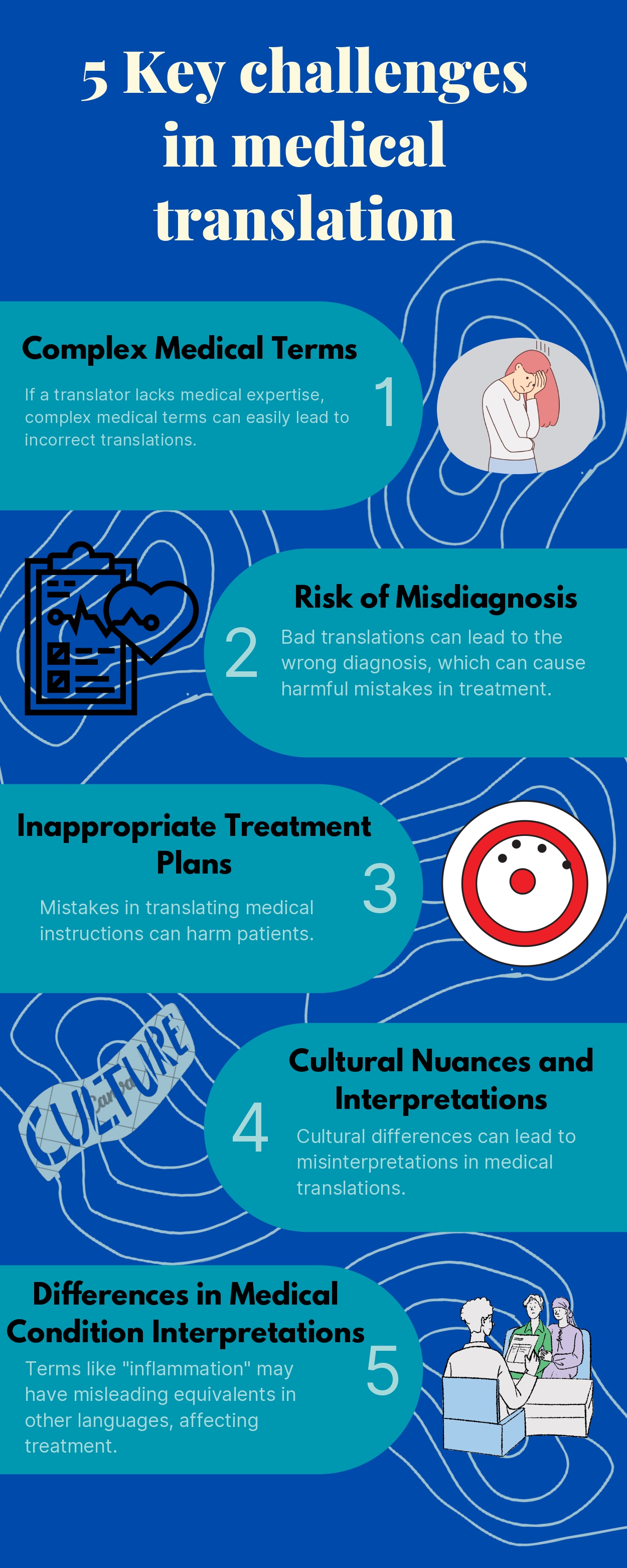Medical Terminology Translation: Strategies for Accuracy and Compliance
Effective communication transcends mere convenience—it is a fundamental necessity. Accurate translations are vital for ensuring patient safety and seamlessly facilitating healthcare services across international borders.
This article dives deep into the world of medical translations, outlining the challenges, technological aids, and the importance of professional expertise in this field.
Understanding medical terminology translation
Medical terminology translation involves converting medical information and jargon from one language to another. Medical terminology translation is a critical service that enables healthcare providers to communicate effectively with patients, overcoming language barriers.
Additionally, it ensures that medical documentation adheres to global regulatory standards. For instance, a clinical trial document translated accurately can mean the difference between its approval or rejection in non-English speaking countries.
Read more: Medical Translation: A Comprehensive Guide
5 Key challenges in medical translation
We recently conducted interviews with Tomedes' medical translators to delve into the key challenges they face in their work. Here are the key challenges in medical translation:
Complexity of Medical Terminology: Medical terms are inherently specialized and complex. This complexity makes it easy for translations to be inaccurate if the translator does not have sufficient medical knowledge.
Risk of Misdiagnosis: Incorrect translations can lead to misdiagnoses, where the medical condition is incorrectly identified, potentially resulting in harmful treatment errors.
Inappropriate Treatment Plans: Errors in translating treatment plans, medication dosages, or surgical instructions can lead to inappropriate care, endangering patient health.
Cultural Nuances and Interpretations: Cultural differences can affect the interpretation of medical information. Words and phrases that are medically specific in one language may not have a direct equivalent in another, leading to misunderstandings.
Differences in Medical Condition Interpretations: Terms like "inflammation" that seem straightforward in one language may translate into a term that implies a different medical condition in another language, which can significantly alter the treatment approach.

Technologies and techniques for effective translation
Advancements in technology have significantly impacted the field of medical translations. Tools such as Computer-Assisted Translation (CAT) tools and specialized software that leverage Artificial Intelligence (AI) can improve the accuracy and efficiency of translations.
For example, AI algorithms are trained to recognize and translate complex medical terms that might be beyond the scope of general translation tools, ensuring higher precision in projects involving medical document translation.
Quality assurance in medical translations
Ensuring quality in translations involves meticulous proofreading, editing, and consultation with medical experts. This rigorous process is absolutely crucial for medical translation providers, where the margin for error is virtually zero. Imagine a scenario where a dosage instruction is incorrectly translated—this could lead to a life-threatening situation. Therefore, maintaining a high standard of quality assurance is paramount for the safety of patients and the credibility of healthcare providers.
Regulatory compliance and industry standards
Compliance with international regulatory standards is a cornerstone of medical translation. Documents such as drug labels, clinical trial reports, and consent forms must adhere to stringent regulations across different countries. For instance, the European Medicines Agency (EMA) has specific guidelines for the translation of medical documents that must be meticulously followed to market pharmaceutical products across Europe.
The role of medical translators
The expertise of certified translators specialized in the translation of medical terms is indispensable. These professionals are not only fluent in multiple languages but also have a deep understanding of medical terminology and procedures. Choosing the right translation service provider means assessing their experience in the medical field, as well as their ability to handle complex medical translations with accuracy and cultural sensitivity.
Read more: Understanding Certified Translations: A Comprehensive Guide
Cultural competence and sensitivity
Cultural competence in medical translation extends beyond mere linguistic abilities; it necessitates a deep understanding of the diverse cultural beliefs and practices that can significantly influence health-related behaviors. This understanding is crucial as certain medical procedures or treatments may be considered taboo in some cultures while being acceptable in others.
Effective medical language translation must respect and integrate these cultural differences to ensure clear and respectful communication, thereby enhancing patient care and trust in medical interventions. By acknowledging and addressing these cultural variances, translators can facilitate more accurate and culturally sensitive healthcare interactions.
Future trends in medical translation
In the future, the integration of technology in medical translation will increase. Real-time translation solutions powered by AI are expected to become more prevalent, facilitating instant communication between healthcare professionals and patients with different language backgrounds. This advancement could revolutionize international healthcare services, making them more accessible and efficient.
Conclusion
The field of medical document translation is both challenging and crucially important. As the world becomes more interconnected, the demand for accurate and reliable medical translations will only grow. By understanding the intricate nature of medical terminology, leveraging advanced technologies, and employing skilled professionals, we can continue to improve the quality of healthcare translations.
Need accurate medical translations that respect cultural nuances? Choose Tomedes for reliable, high-quality medical translation services. Our team combines expert linguistic skills with deep cultural understanding to ensure your medical communications are both clear and compliant. Contact Tomedes today and ensure excellence in every translation.

By Clarriza Heruela
Clarriza Mae Heruela graduated from the University of the Philippines Mindanao with a Bachelor of Arts degree in English, majoring in Creative Writing. Her experience from growing up in a multilingually diverse household has influenced her career and writing style. She is still exploring her writing path and is always on the lookout for interesting topics that pique her interest.
Share:
GET IN TOUCH
Need expert language assistance? Inquire now
Try free AI tools to streamline transcription, translation, analysis, and more.
Use Free Tools
Post your Comment